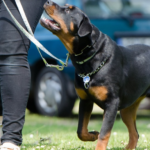Rottweiler puppies are known for their loyalty, bravery, and protective nature. However, without proper behavior training, these traits can become problematic. In this article, we will discuss the importance of behavior training for Rottweiler puppies and provide tips for mastering it.
Watch this video for more information about rottweilers puppy training:
Understanding Rottweiler Puppy Behavior
Rottweiler puppies, like all puppies, have a lot of energy and curiosity. They are also highly intelligent and eager to please, which makes them quick learners. However, without proper guidance, Rottweiler puppies can develop behavior issues such as aggression, anxiety, and destructiveness.
The Importance of Early Training
Early training is essential for Rottweiler puppies as it helps to shape their behavior and personalities. By starting training early, you can teach your puppy how to behave appropriately and prevent problem behaviors from developing. Additionally, early training can also help to strengthen the bond between you and your puppy.
Tips for Mastering Behavior Training
- Consistency is key: Consistency is crucial when training Rottweiler puppies. Stick to a training schedule and use the same commands every time. This will help your puppy to understand what you expect from them.
- Positive reinforcement: Reward your puppy when they display good behavior. This can be in the form of treats, praise, or playtime.
- Be patient: Training takes time and patience. Remember to be patient with your puppy and never use physical punishment.
- Socialization: Socialization is an important aspect of behavior training. Introduce your puppy to new people, animals, and environments to help them develop confidence and social skills.
- Professional training: Consider enrolling your puppy in a professional training class. This can provide additional support and guidance for you and your puppy.
What’s the best way to train a Rottweiler puppy?
The best way to train a Rottweiler puppy is through positive reinforcement and consistency. This means rewarding your puppy for good behavior, such as sitting or lying down on command, with treats or praise. This not only strengthens the bond between you and your puppy, but also encourages them to repeat the desired behavior. It’s important to use the same commands and training techniques consistently, so that your puppy knows what to expect and can respond accordingly.
In addition to positive reinforcement, socialization is also an important aspect of training a Rottweiler puppy. This means exposing your puppy to different people, animals, and environments, so that they can learn to interact with the world around them in a positive and confident way. This can help prevent problem behaviors such as aggression or anxiety from developing. Professional training classes can also be a great resource for learning how to train your Rottweiler puppy effectively. These classes can provide additional support and guidance, as well as a structured training environment.
How do you control a Rottweiler puppy?
Controlling a Rottweiler puppy requires a combination of training, consistency, and leadership. One of the most effective ways to control a Rottweiler puppy is through positive reinforcement training, where you reward your puppy for good behavior and discourage bad behavior. This helps your puppy to understand what you expect from them and encourages them to behave appropriately. Consistency is also key in controlling a Rottweiler puppy. By using the same commands, routines, and expectations every day, your puppy will have a clear understanding of what is expected of them.
Another important aspect of controlling a Rottweiler puppy is establishing yourself as a leader. This means being assertive and confident in your commands and decisions, and not giving in to your puppy’s demands. Rottweilers are pack animals and will naturally look to a strong leader for guidance. By being a consistent and assertive leader, your puppy will be more likely to follow your commands and behave appropriately. It’s also important to establish boundaries and rules for your puppy, and consistently enforce them. This helps your puppy to understand what is acceptable behavior and what is not.
When should I start training my Rottweiler puppy?
It’s recommended to start training your Rottweiler puppy as soon as you bring them home. Starting early is important because it helps to shape their behavior and personalities, and prevent problem behaviors from developing. Puppies have a critical period of socialization between 3 to 14 weeks old, where they are most receptive to new experiences and learning. The earlier you start training, the more effectively you can take advantage of this window, and the better prepared your puppy will be for the future.
However, it’s important to note that Rottweiler puppies are not fully physically or mentally developed until around 18 months old, so you should keep training consistent and ongoing throughout the puppyhood and into adulthood. Basic obedience training such as Sit, Stay, Come, Heel and Leave It commands are essential. Basic manners such as not jumping on people, not begging for food and not chewing on inappropriate items are also important to teach early on. Additionally, socialization with different people, animals, and environments should be a continuous process throughout their life.
Rottweiler puppy behavior stages
Rottweiler puppies go through several behavior stages as they grow and mature. The first stage, from birth to around 3 weeks old, is the neonatal stage. During this time, puppies are completely dependent on their mother and are not yet able to see or hear. They will begin to develop their sense of smell and start to explore their environment.
The second stage, from 3 to 12 weeks old, is the transition stage. During this time, puppies begin to develop their vision and hearing and become more mobile. They also start to become more independent from their mother and will begin to explore their environment more. This is also the critical period of socialization where puppies are most receptive to new experiences and learning, and it’s the best time to start training and socialization. They will start to learn about their place in the pack and will start to understand basic commands. This is also the stage where puppies will start to develop their personalities.
It’s important to note that these are general guidelines, and each puppy may develop at their own pace. Additionally, behavior development does not stop after 12 weeks old, as Rottweiler puppies will continue to mature and learn throughout their life.
Conclusion
In conclusion, Rottweiler puppies go through several behavior stages as they grow and develop. Understanding these stages and providing proper training and socialization during the critical period of socialization (3-12 weeks) can help shape their behavior and prevent problem behaviors from developing. It’s important to start training early and be consistent with commands and training techniques. Additionally, being a strong and consistent leader, and establishing boundaries and rules, can also help control a Rottweiler puppy. Remember that training and socialization is an ongoing process that should continue throughout the puppyhood and into adulthood. With the right guidance, a Rottweiler puppy can grow into a well-behaved and loving companion.







